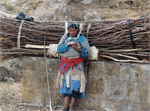Published on Mon, 2015-03-23 00:00
When the World Economic Forum (WEF) met last January in Switzerland, attended mostly by the rich and the super-rich, the London-based charity Oxfam unveiled a report with an alarming statistic: if current trends continue, the world’s richest one percent would own more than 50 percent of the world’s wealth by 2016. And just 80 of the world’s richest will control as much wealth as 3.5 billion people: half the world’s population. The post-2015 development agenda will only succeed if the SDGs include meaningful and time-bound targets and commitments for the rich that trigger the necessary regulatory and fiscal policy changes. |
Published on Sun, 2015-03-22 00:00
At its 14th session, last February, the Human Rights Council Advisory Committee (“the Advisory Committee”) addressed for the first time the impacts of so-called vulture funds on human rights. “Vulture fund” is a generic name used to designate financial entities that use as a profit-making strategy the purchase of distressed debt owed by a sovereign debtor – that is, a State- on the cheap with the purpose of suing for the full amount once conditions for repayment improve. In a resolution adopted last September, the Human Rights Council entrusted the Human Rights Council Advisory Committee with the preparation of “a research-based report on the activities of vulture funds and the impact on human rights.” In preparation of that report it requested the same Committee to seek views of, among others, national human rights institutions and non-governmental organizations, human rights mechanisms, Member States and relevant international and regional organizations. |
Published on Sat, 2015-03-21 20:30
The 23-27 March session of the Post-2015 intergovernmental negotiations will focus on the Sustainable Development Goals and Targets. The choice of indicators for the SDGs is a major policy decision with long-term consequences -- nationally and globally. This has sparked ongoing discussion over whether the indicators should be technical or politically negotiated (or a combination). |
Published on Fri, 2015-03-20 10:45
On Monday, the 23rd of March 2015, government representatives will meet at UN Headquarters for five days of negotiations on the SDG’s goals, targets and indicators. Governments should resist the temptation –particularly when looking at targets and indicators- to be restricted by existing quantitative monitoring systems and the current (and limited) availability of data. Instead, Governments should set a truly transformative and ambitious framework, which will lay the ground for innovative monitoring systems, which include qualitative assessments for key SDG targets such as “policy space” and “justice for all”. Voices of citizens need to be heard to capture the dark corners of inequalities within and among countries and to channel the potential of a 'data revolution' without infringing on privacy or sovereignty. |
Published on Thu, 2015-03-19 18:39
On the 18th March, the Public Services International Research Unit (PSIRU) hosted a side event in New York to promote the report “Why Public-Private-Partnerships don’t work”. The report assessed the impact of Public-Private Partnerships (PPPs) actually undertaken in rich and poor countries. These global case studies show that there is no evidence that PPPs are cheaper or more convenient for governments in the long-term. |
SUSCRIBE TO OUR NEWSLETTER







